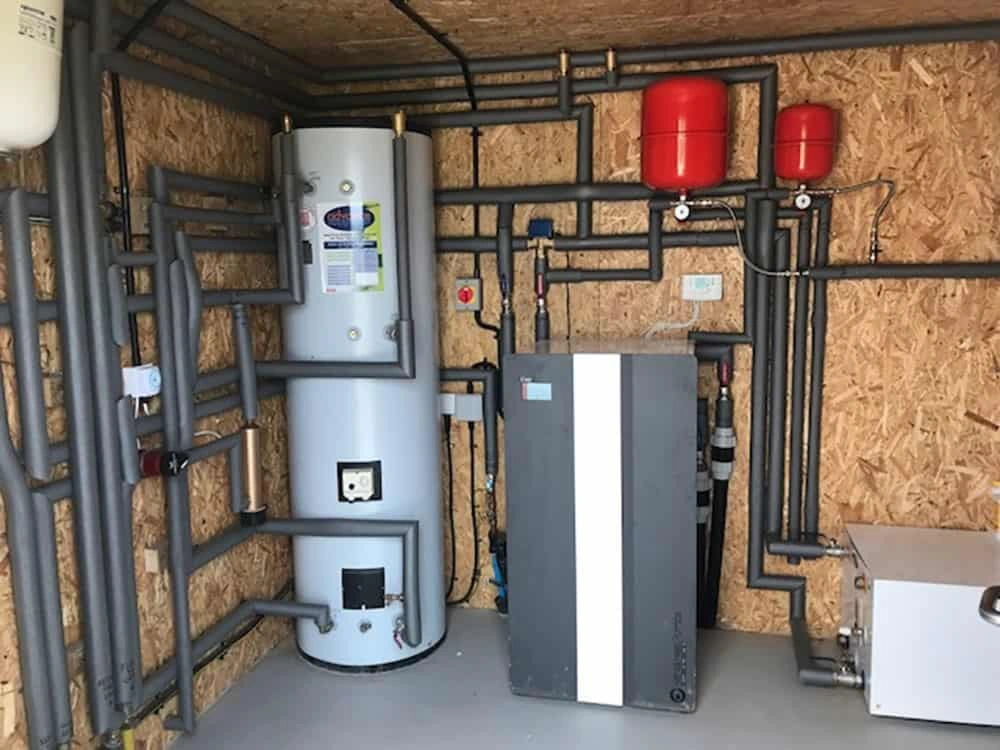Ground Source Heat Pump Installation
Installation Of Ground Source Heat Pumps In The UK
Ground Source Heat Pump Installation Service
Are you thinking of converting your home’s heating and cooling system to a more efficient, cost-effective one? If so, then you may want to consider a ground source heat pump installation. Ground source heat pumps are becoming increasingly popular due to their many benefits, which include lower energy bills and a smaller carbon footprint.
Heat Pump installers
If you live in an area with a moderate climate, a ground source heat pump can be an excellent choice for your home. In fact, ground source heat pumps are one of the most efficient types of heat pumps on the market. They work by using the earth’s natural heat to warm your home in the winter and cool it in the summer. At Heat Pump Installers we can help you pick the right ground source heat pump system for your home or business and budget, and our experienced team will handle the installation process from start to finish.
Below is a list of our most asked questions when it comes to ground source heat pump installation. If you have any additional questions, please don’t hesitate to contact us and we’d be happy to help.
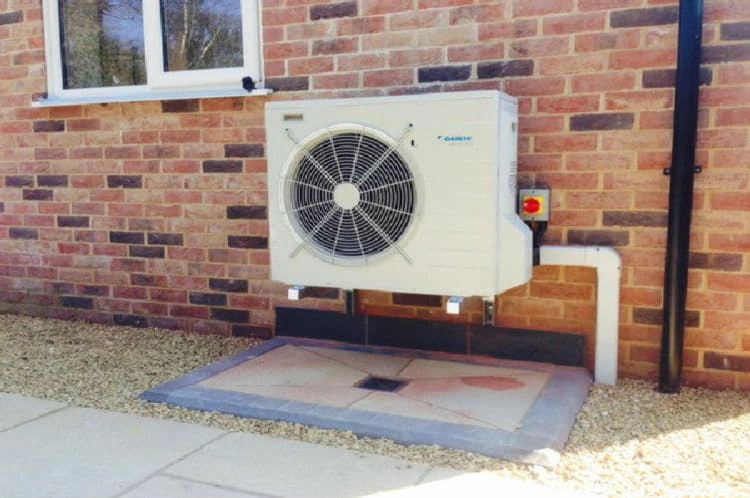
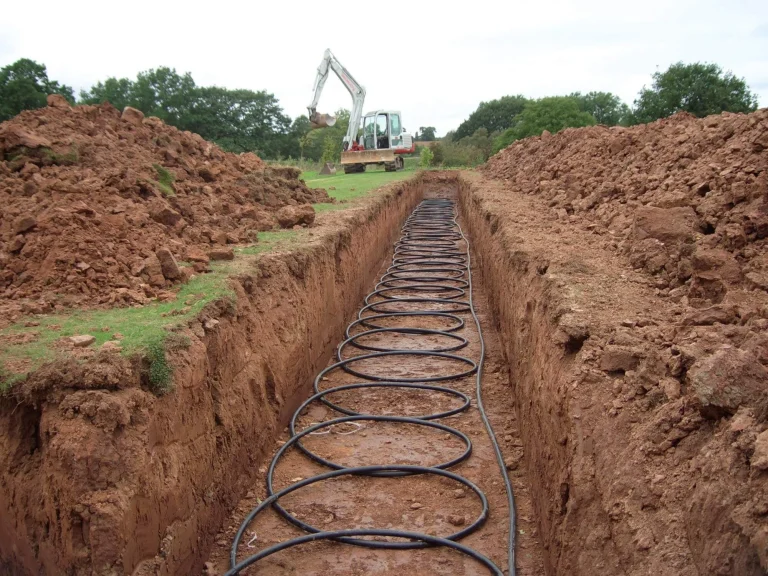
How Much Land Do You Need For A Ground Source Heat Pump?
Between 600 and 1200 square meters. The longest loop of pipe can reach up to 400 meters, however, depending on the size of the heat pump required, you may need two or more ground loops. Between 600 and 1200 square meters of land will be needed for the average system. Trees and structures must be removed from this area. If the land is an issue you can always think about our Hybrid Heat Pump Installation service that only needs a small amount of space to install.
How Deep Does The Ground Source Heat Pump Need To Be?
Drilling a ground source heat pump borehole. A borehole is a hole drilled between 60 and 200 meters deep. The diameter of a borehole ranges from 110 to 150mm, depending on the type of machine used to drill the hole. The ground loop is made of high-density polyethene (HDPE) pipe, which is inserted into the borehole.
Installation Service For The United Kingdom!
Is A Ground Source Heat Pump Worth It?
Ground source heat pumps may be worth it because of their high efficiency and low running costs, making them a great choice for low carbon heating. The initial investment for a ground source heat pump is higher than other types of heating systems, but the payback period is shorter because of their high efficiency.
What Are The Benefits Of A Ground Source Heat Pump?
The main benefit of a ground source heat pump is that it provides an efficient and cost-effective way to heat and cool your home. Ground source heat pumps are also a great choice for the environment because they have a smaller carbon footprint than other types of heating and cooling systems.
What Are The Disadvantages Of A Ground Source Heat Pump?
The main disadvantage of a ground source heat pump is the initial investment cost. Ground source heat pumps also require regular maintenance to keep them running efficiently.
What Are The Benefits Of Ground Source Heat Pumps?
There are many benefits to using a ground source heat pump, including:
- Reduced emissions of carbon dioxide and other greenhouse gases
- Low running costs
- No need for fossil fuels
- Reduced noise pollution
- Increased property value
- Government incentives (such as the Renewable Heat Incentive)
We Are Here For Any Questions!
How Long Does It Take To Install A Heat Pump?
The installation process for a ground source heat pump can take anywhere from a few days to a few weeks, depending on the size and complexity of the system. Heat Pump Installers has a team of experienced installers who can handle your ground source heat pump installation quickly and efficiently.
Can I Get A Grant For A Ground Source Heat Pump?
The ECO is a government program that provides funding for retrofitting ground source heat pumps into social housing units. It requires major energy suppliers to finance efficiency upgrades for domestic energy consumers. The current ECO3 timetable expires on March 31, 2022.
Can I Install A Ground Source Heat Pump Myself?
Installing a ground source heat pump into your home is not an easy task and is not typically carried out by the homeowner. There are many considerations, including the sizing, design and installation that require expertise to ensure the most efficient heating system. If you are considering a ground source heat pump for your home, we recommend that you contact Heat Pump Installers to discuss your options. We also offer an Air Source Heat Pump Installation, helping you find the right system is our priority.
Repairs & Maintenance
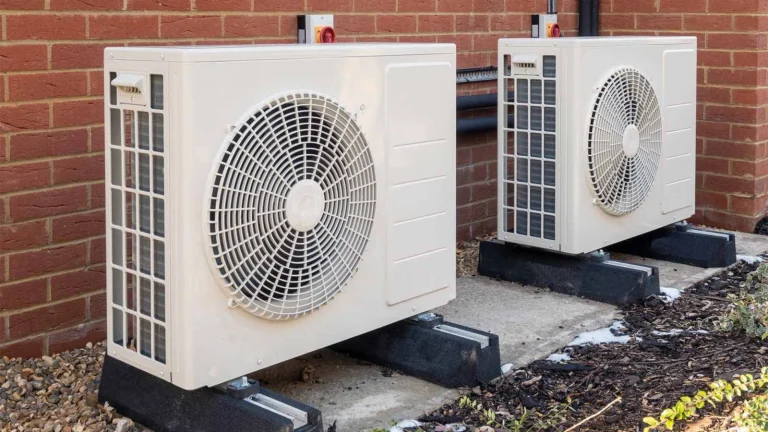
Do Ground Source Heat Pumps Use A Lot Of Electricity?
A ground-source heat pump can produce 3 to 4 kilowatts of heat for every 1 kilowatt of electricity it consumes. It has higher efficiency than any other heating system thanks to its use of freely available ground heat energy.
How Do Ground Source Heat Pumps Work?
A ground source heat pump uses a network of buried pipes, called a ground loop, to extract heat from the ground. This heat is then used to heat your home in the winter and cool it in the summer. The ground loop can be installed horizontally or vertically, depending on the space available and the soil conditions.
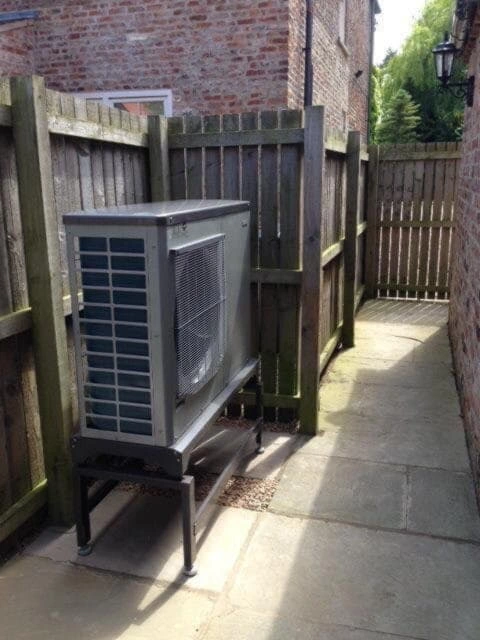
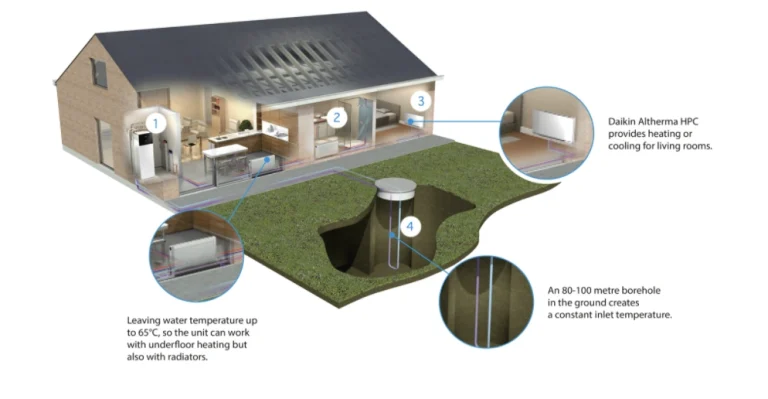
Can Ground Source Heat Pumps Work With Radiators?
Yes. The radiators are usually oversized to deliver the right flow temperatures when ground source heat pumps are utilized with radiators.
What Type Of Maintenance Do Ground Source Heat Pumps Need?
Ground source heat pumps require regular maintenance to keep them running efficiently. This includes checking the fluid levels in the system, cleaning the filters, and checking the electrical components. Heat Pump Installers can provide you with a maintenance plan that is tailored to your specific needs.
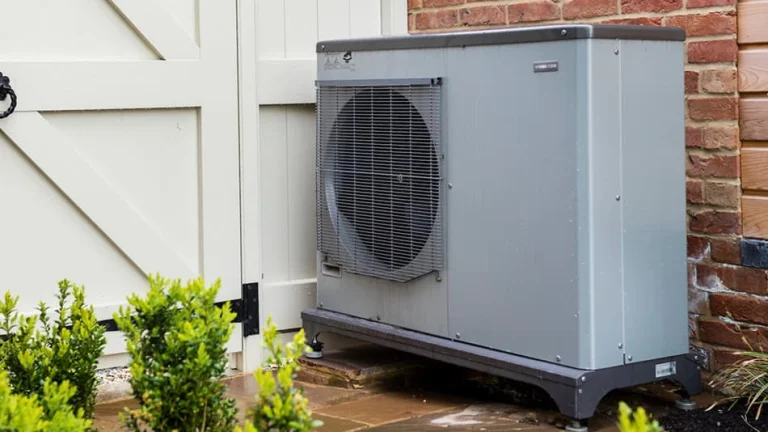
What Are The Running Costs Of A Ground Source Heat Pump?
The running costs of a ground source heat pump are lower than other types of heating and cooling systems because of their high efficiency. In addition, the cost of the electricity used to operate a ground source heat pump is often lower than the cost of gas or oil.
FAQ
How Do I Choose The Right Ground Source Heat Pump?
When choosing a ground source heat pump, it is important to consider the size of your property, the climate, and the soil conditions. Heat Pump Installers can help you select the best system for your needs.
Do Ground Source Heat Pumps Work In Winter?
A ground source heat pump extracts heat from the ground – whose temperature will be warmer than the air in winter (and cooler than the air in summer). For this reason, they are more efficient than air source heat pumps, especially in the coldest weather when they are most needed.
How Do You Qualify For A Free Ground Heat Pump?
Finding a suitable candidate for the free heat pump is not straightforward. Individuals willing to pay must be registered investors. They must be on either The Renewable Energy Consumer Code (RECC) or the Home Insulation and Energy Systems Contractors Scheme (HIES) to be a Domestic RHI Registered Investor. Installers who are Microgeneration Certification Scheme (MCS) accredited can also register customers.
How Much Does A Ground Heat Pump Cost UK?
The cost of a ground source heat pump is dependent on many factors. Ground source heat pumps may cost anything from £8,000 to £35,000 for a system and installation. Naturally, the price differs based on the system you pick. The size of your property, the climate, and the soil conditions all play a role in the price. There is a UK Government Boiler Upgrade Scheme that offers grants to help with the cost. Heat Pump Installers can help you select the best system for your needs and provide you with a quote for installation.
How Noisy Are Ground Source Heat Pumps?
The heat pump is a very efficient heat pump, which means it will save you money on your power bills while providing the same service as an air source heat pump. They are also not loud since they do not take heat from the air and do not require a fan. As a result, they can be placed inside and are quite quiet. You can also get mini-split systems that are ductless and very efficient. Our Ductless Mini-Split Heat Pumps Installation service is here to help with any questions you may have.
How Long Does It Take To Install A Ground Source Heat Pump?
The installation of a ground source heat pump usually takes one to two days for an experienced installer like Heat Pump Installers. This time frame can be extended depending on the size and complexity of the system being installed.
Can A Ground Heat Pump Heat A Whole House?
A whole-house heat pump can provide heating and cooling for your entire home, making it a great choice for those who want an energy-efficient solution.
Do You Need A Boiler With A Ground Source Heat Pump?
The units that you’ll find in most homes are not powerful enough to function as high-temperature boilers; however, they might be used for low-flow hot water systems. These heat pumps are designed for hot water and should not be used as a high-temperature boiler replacement unless the lower efficiency has been calculated to ensure that it will still meet your needs.
Which Is A Better Ground Source Heat Pump Or Air Source Heat Pump?
Overall, ground source heat pumps are more efficient than air source heat pumps. This is because water may transfer heat through the ground via the movement of water and because a liquid, water can store more heat than air can. In more technical terms, the heat capacity of water is about 4 times greater than that of air.
How Much Does It Cost To Run A Heat Source Pump?
It costs around 4.65p per kWh to heat a home with gas, 4.82p per kWh for oil, 7.70p per kWh for LPG, and about 20.06p per kWh with standard electric heaters according to the Energy Saving Trust. A typical air source heat pump costs 5.73p per kilowatt-hour (kWh) to heat a home according to the same source, while a ground source heat pump costs 4.97p per kWh.
What Size Ground Source Heat Pump Do I Need For My House?
In reply, the average size of the house is roughly 20 to 30 per cent larger than that of a mobile home. This will depend on many factors such as heat loss, age of the property, and room types. A 4kW ground source heat pump or a 5kW ground source heat pump is required for a 100 sq m mansion. The larger the house, the bigger the heat pump will need to be.
How Does A Ground Source Heat Pump Work?
Ground source heat pumps work by extracting heat from the ground and using it to heat your home. The ground temperature is constant, so it can efficiently heat your home in the winter and cool it in the summer. A ground source heat pump typically has a lifespan of 25 years or more, making it a very efficient and long-lasting heating solution.
Do You Still Have Radiators With A Heat Pump?
Radiators will continue to be the preferred method of discharging heat into a room long after heat pumps are used in houses, and they work with heat pumps. In fact, many modern houses are using a combination of heat pumps and radiators to provide an efficient heating system.
If you have any other questions about heat pumps or installation, we have helpful Heat Pump FAQs with all our most asked questions. Heat Pump Installer’s team of experts will be happy to help you choose the best option for your needs and provide you with a quote for installation.
Can I Swap My Boiler For A Ground Source Heat Pump?
The most difficult aspect of a major home improvement project is in fact the physical act of swapping a boiler for a ground source heat pump. In theory, replacing a boiler with a ground source heat pump in an existing property is simpler than it appears. The plumbing will already be in place because your boiler will be linked to an existing central heating system, but the electrical work required to install a ground source heat pump will be more complicated.
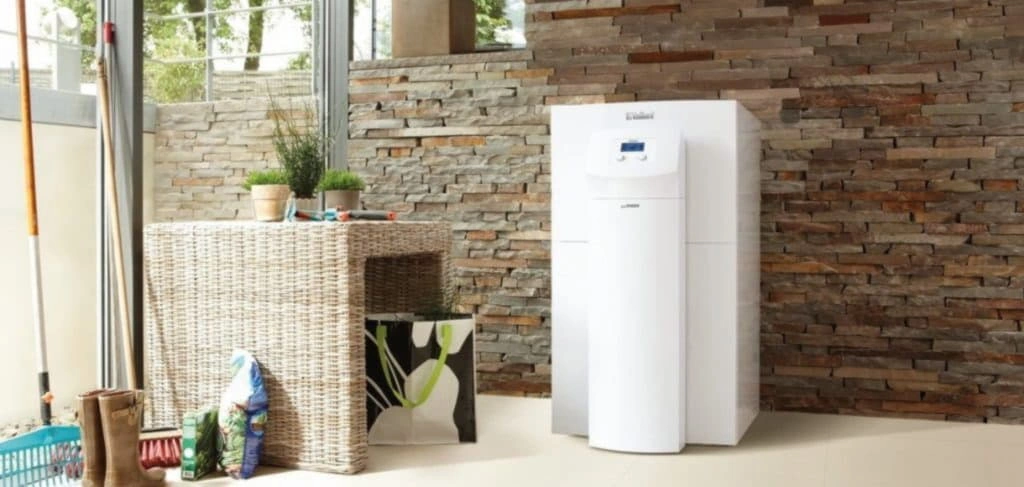
What Are The Different Types Of Ground Source Heat Pumps?
There are two main types of ground source heat pumps: air-source and water-source. Air-source heat pumps are more common in residential applications, while water-source heat pumps are more common in commercial applications. Our Heat Pump Installer Near Me is on hand to help with any type of installation you may require.
Do You Need Planning Permission For A Ground Source Heat Pump?
A ground source heat pump or a water source heat pump installation on residential property is often seen as permitted development that does not require an application for planning permission. You should contact your municipality to determine any local restrictions if you live in a listed building or a conservation area.
